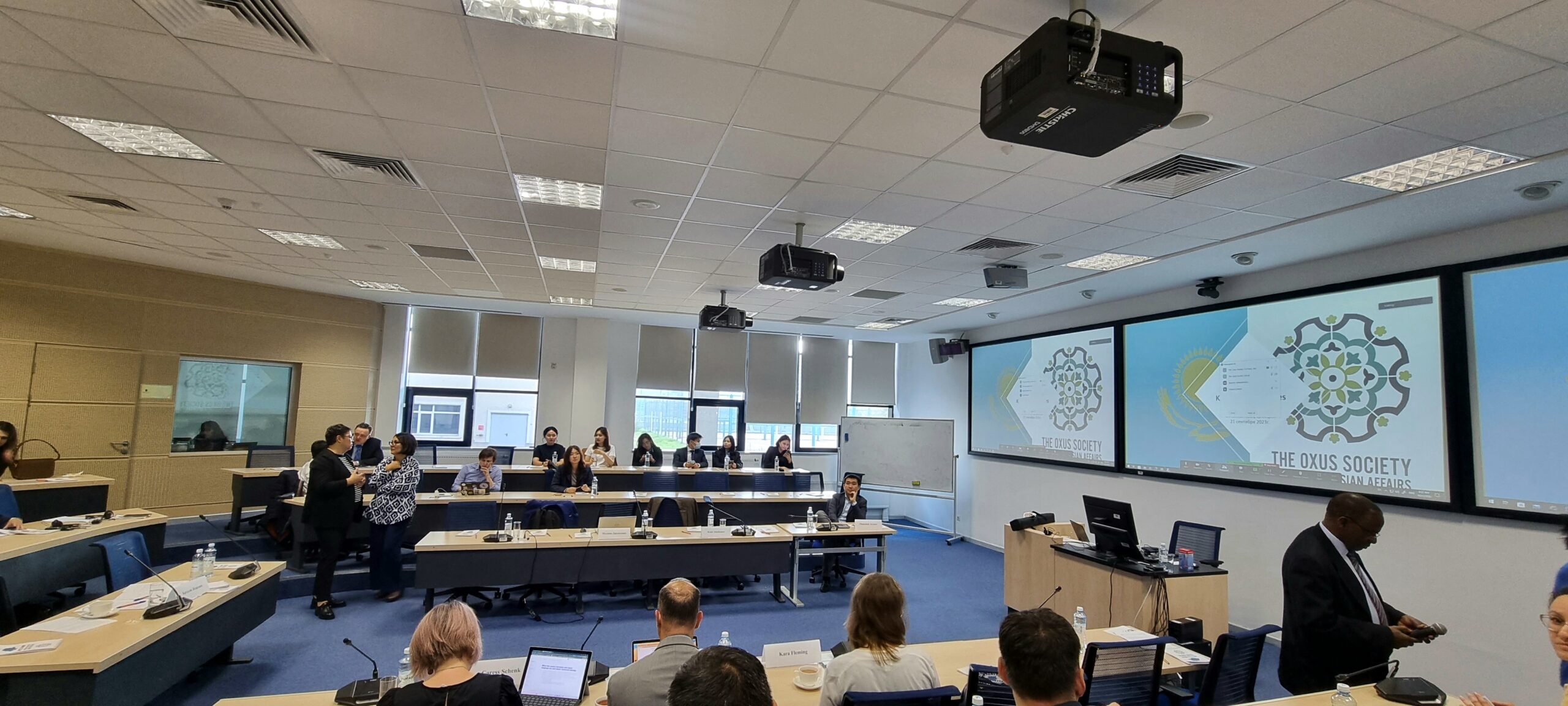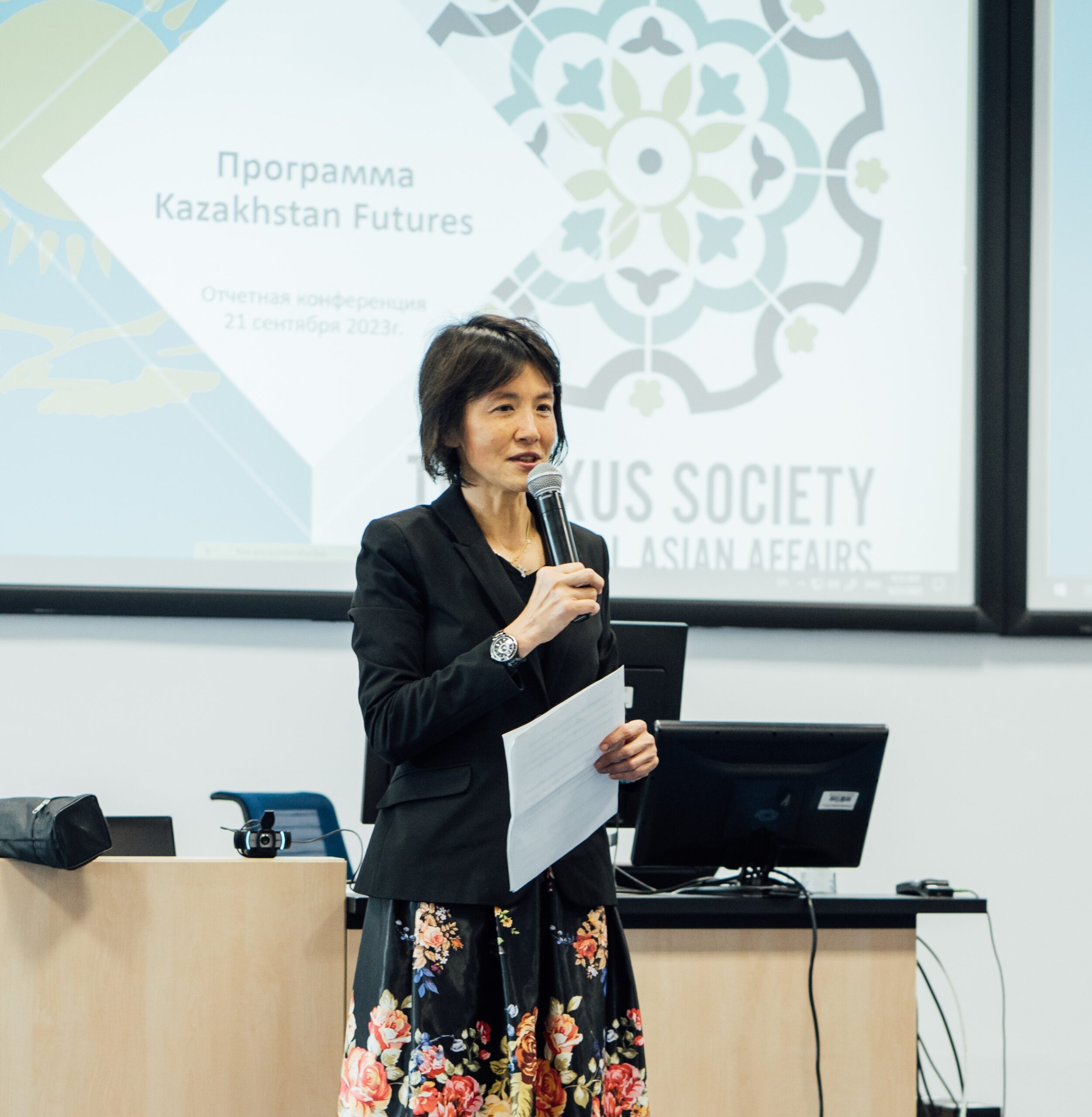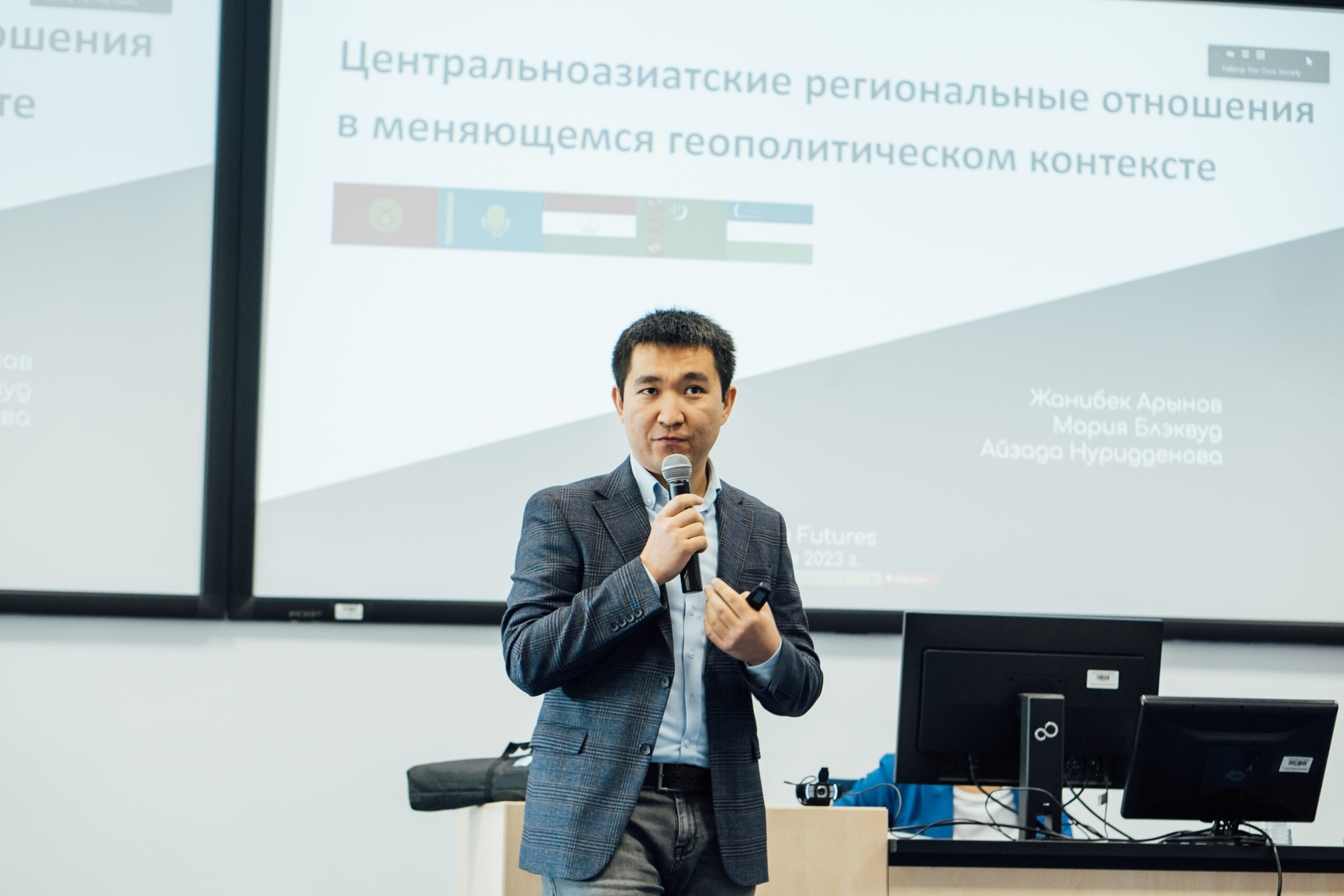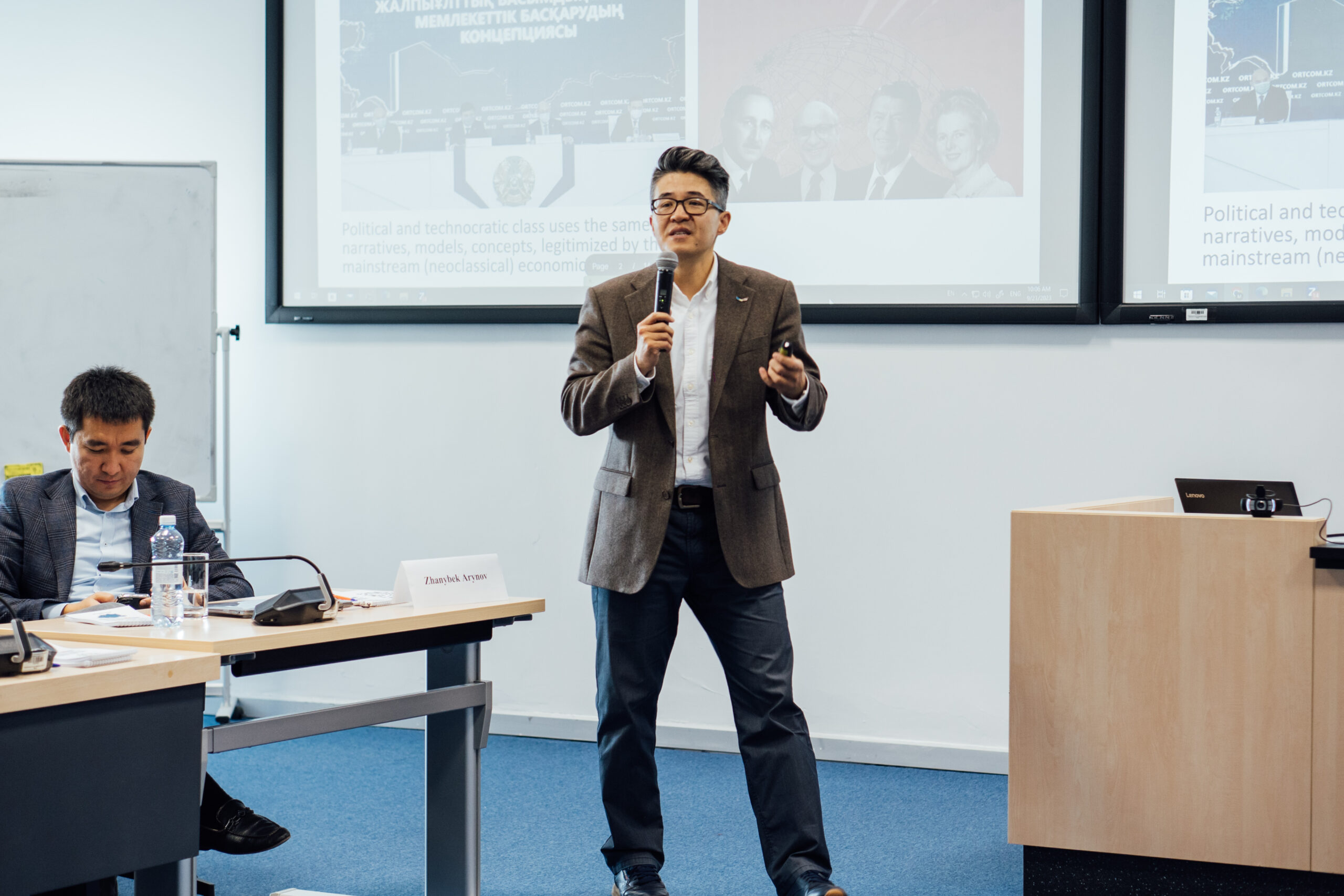ASTANA – The leading researchers from the United States and Kazakhstan presented their recommendations for addressing long-term development issues in Kazakhstan and Central Asia. The event was organized as part of the Oxus Society for Central Asian Affairs’ Kazakhstan Futures Program at Nazarbayev University on Sept. 21.

Photo credit: Oxus Society.
The Oxus Society for Central Asian Affairs program was launched on Jan. 26 with a mission to build knowledge and understanding of Kazakhstan and Central Asia.
The researchers collaborated to formulate policies aimed at tackling a range of issues, including climate change and the green economy, migration, economic diversification, and foreign policy.
According to Edward Lemon, the president of the Oxus Society and research assistant professor at Texas A&M University, the Kazakhstan Futures Program intended to help devise solutions to the country’s most pressing challenges and support the government in undertaking reforms.
“Today, 16 experts from Kazakhstan, Europe, and the U.S. are presenting their research on topics crucial to the region’s future. These topics encompass the transition to green energy and the shift away from hydrocarbons, the challenges that monotowns heavily reliant on extractive industries face. The discussions also delve into topics such as the evolving Kazakh identity, particularly in the three decades since Kazakhstan gained independence, and the concept of multi vectorism,” he said.
Lemon also mentioned that one of the research groups has examined the issue of rising regionalism, in which Kazakhstan plays a pivotal role.

Debora Lo, the U.S. Mission’s Public Diplomacy Officer. Photo credit: Oxus Society.
Debora Lo, the U.S. Mission’s Public Diplomacy Officer, expressed the embassy’s enthusiastic support for this program and its commitment to ongoing support.
She emphasized the importance of nurturing young leaders and connecting them with other experts to enable their growth and leadership in their respective fields.
“This aligns with the goals of the Public Diplomacy section, which I oversee at the U.S. Embassy. We aim to support Kazakhstan in becoming a regional leader within the Central Asian C5 configuration,” she said.
Lo expressed hope that these emerging young leaders would eventually assume roles as government officials, leaders, and think tank experts, paving the way for Central Asia’s prosperity in the future.

Zhanibek Arynov, an assistant professor of political science at Nazarbayev University. Photo credit: Oxus Society.
Zhanibek Arynov, an assistant professor of political science at Nazarbayev University, collaborated with Maria Blackwood from the Congressional Research Service and Aizada Nuriddenova from Suleyman Demirel University to conduct research on Central Asian regional relations within the evolving geopolitical landscape.
“We chose to focus on the collaborative efforts among the Central Asian countries, tracking how this cooperation has evolved over time, the topics under discussion, and the overarching trends in inter-regional cooperation,” said Arynov.
He said that historically, Central Asia has been one of the world’s least connected regions. However, since 2016, there has been a noticeable uptick in regional cooperation dynamics.
“Many attribute this to political change in Uzbekistan and a corresponding shift in its foreign policy, which has resulted in new and promising developments in inter-regional cooperation,” he noted.
Kuat Akizhanov, an associate professor at the Higher School of Economics at Narikbayev Kazakh State University, presented research offering fresh perspectives on the transformation of modern capitalism and its adjustments in pursuit of increased capital accumulation in emerging Eurasian economies.

Kuat Akizhanov, an associate professor at the Higher School of Economics at Narikbayev Kazakh State University. Photo credit: Oxus Society.
This analysis includes case studies highlighting the excessive focus on economic growth, microcredit, and an intense drive for competitiveness, all employed within Kazakhstan to strengthen its integration into the global neoliberal framework.
Maximilian Hess, a Central Asia Fellow in the Eurasia Program at the Foreign Policy Research Institute, discussed the Janatas Wind Farm as a case study for international investments in green energy in Kazakhstan. The wind farm, with a capacity of 100 megawatts located in Janatas, in Southern Kazakhstan. It was built during the COVID-19 pandemic and launched in June 2021.
The research highlighted this project as a model for international cooperation between financial institutions to assist Kazakhstan and other nations in developing similar green energy resources, advancing their sustainable energy goals, and supporting domestic markets.
“The Janatas Wind Farm is particularly noteworthy as it marks the first collaboration between two development banks: the London-based European Bank for Reconstruction and Development (EBRD), with the United States as its largest capital contributor, and the Beijing-based Asian International Investment Bank (AIIB), with China as its largest shareholder,” Hess noted.
This project’s success has already resulted in a subsequent financing agreement in which both the EBRD and the AIIB are providing financing for another 100-megawatt wind farm in Kazakhstan, the Shokpar Wind Farm.
Madina Zhunussova, a fellow teacher affiliated with the CERGE-EI Foundation, unveiled three scenarios during a presentation aimed at assessing the potential impact of Kazakhstan’s new carbon neutrality policy on extractive cities and regions within the country. The third scenario emerged as the preferred option, as it advocates for the adoption of a decarbonization strategy that involves reinforcing regional policies, directing them towards resource decentralization, and enhancing the role of local governance. This approach seeks to engage the local population and businesses in the process of economic diversification while simultaneously improving the quality of life in mining and other cities and regions throughout Kazakhstan.
By comparing the potential positive and negative economic, social, and environmental consequences of these scenarios, a recommended action plan is proposed to prepare extractive cities and regions in Kazakhstan for decarbonization while considering the possibility of achieving sustainable development.

